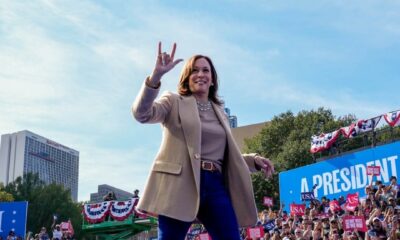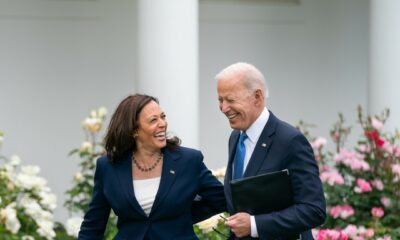Promotions
Reframing Power: An Impact Storyteller’s Exploration of Africa’s Female Leadership Revolution
Written by Delmwa Deshi-Kura
As a Narrative Change Leader working in Africa, from a global perspective, my work requires delving into history to better predict future social patterns, and inturn, craft alternate narratives that help reframe how the World, and indeed Africans perceive and engage with the most pressing social issues of our time to drive positive social change.
While my curiosities span a range of topics, including leadership, economic inequities, climate action, and the political engagement of youths, my primary subject of intrigue remains Power, and the attendant confining Gender Dynamics experienced by women in Politics, globally.

In 2025, the global community will mark the 30th anniversary of the Beijing Declaration and Platform for Action on the global status of women, a significant moment in the pursuit of gender equality, held in September 1995.
I recall, as a young girl, watching hours of live broadcasts showing a vast assembly of women from across the world from every race, color, and creed—engaged in critical, often heated discussions. When I asked what it was about, my mother and aunts, with great optimism, told me it was so that one day, I could be President; Even for an entitled Daddy’s Girl with no fears – that was a stretch.
Now, three decades later, post experiencing the complexities and challenges of being a working woman building a family and career in a World on the cusp of a defining U.S. election featuring a prominent female contender, just as the United Nations is calling on Member States to conduct and submit a national review of all progress made in implementing the Beijing Declaration or explain the lack thereof; I’ve strangely found myself on the gray line. That said, this moment offers a profound opportunity to reflect on the rise of women to positions of power in National Governments, and the ongoing struggle for true, measurable equity in leadership.
While the global narrative on gender equality has gained momentum, particularly in the Global North, Africa has long had its own quiet, yet powerful revolution. Female leadership is not a new concept for us. In fact, Africa saw its first female president nearly two decades ago when Ellen Johnson Sirleaf was elected in Liberia in 2005, an exact decade after the landmark Beijing Declaration. Since then, we have witnessed the rise of several women led governments across the continent, most recent examples being Samia Suluhu Hassan of Tanzania, Rose Raponda of Gabon, and Sahle-Work Zewde of Ethiopia. These leaders represent a long-standing tradition of female leadership on the continent, demonstrating Africa’s quiet but continued progress in shaping a more inclusive future.
This grossly under-celebrated progress stands in stark contrast to countries like the United States, where the idea of female leadership at the highest levels remains a contentious issue. Despite near-breakthroughs in 2016 with Hillary Clinton’s run for president, the U.S. continues to struggle with the notion of a woman leading the nation.
To date, this narrative remains on the fringes of American political discourse as reflected in the recent Kamala Harris interview with Bret Baier on Fox News, where a debate over her politics quickly degenerated into a disregard for her person, and even office, as a sitting Vice President of what’s supposed to be the World’s leading light in gender equity and democratic values.
So as the World holds its breath to see if “Madam President Harris” could be a reality that brings the World’s champion of equity and democracy into the light, the irony raises a critical question: Why does the West pride itself as the undefeated beacon of progress and equity, and yet lags behind in the area of female political leadership, while parts of Africa, often considered less progressive by global standards, have for decades, maintained steady strides in expanding the power pool for women, and at the highest levels of National Leadership and Governance.
A shining example is Rwanda, whose 2003 Policy of 30% Gender Quota for women in elected positions led to the World’s largest share of women in Government today, with 60% of Parliament being women, a feat yet to be accomplished anywhere in the Global North, or the World, for that matter. Holding these indices in view, it’ll be a fair assessment to declare Africa the true champion of The Beijing Declaration, but why isn’t this celebrated on the global stage?
This well documented and widely accepted dissonance between global perceptions, and known African realities not only reveals a double standard to recognising any sort of progress emanating from Africa, but also speaks to a deeper truth: The World has much to learn from Africa’s quiet, yet revolutionary women.
Nigeria’s Political Inertia and The Struggle For Transformation
Now, bringing it home to Nigeria, Africa’s Giant and most populous nation – Like its fellow giant, the United States, Nigeria remains resistant to female leadership at the highest levels. Like the US, The corridors of power in Nigeria remain predominantly male despite our society’s rich history of women holding esteemed positions as Queens, high priestesses, oracles, and warriors. Women like Queen Amina, Idia, Yaa Nana Asante of neighboring Ghana, all led Kingdoms and armies, wielding immense authority that kept them central to the governance and social fabric of their societies.
This is a reality that confounds experts who track both historical and contemporary data points that consistently point to resources in the hands of women going much further than in the hands of any other demographic. Women, especially in underrepresented communities, are more likely to invest their earnings in their families and communities, ensuring better education, healthcare, and overall well-being for both the aging and young generations in any given family unit, or community.
The ripple effect extends beyond the nuclear family to the broader community, creating a circle of empowerment that lifts entire societies. When women lead, they bring with them a unique perspective—one that is often more inclusive, more empathetic, and more focused on long-term sustainability, rather than short-term gains. And this is precisely why empowering women to lead is not just a moral imperative, but an economic one.
In a country with such great potential, the continued marginalization of women in leadership speaks to the lingering grip of deeply rooted cultural and religious norms that paint leadership as a man’s domain. Despite this, I believe that change is inevitable. The landscape is shifting.
Inventing New Narratives: Hudayah Ali, DCP Osaretin, and The Digital Revolutionaries of Naija NextGen.
In my work, I’ve sought to explore these shifting tides through community engagements and storytelling, by referencing existing models and archetypes to create characters like Hudayah Ali, as delivered in the @NaijaNextGen Series (Currently Showing On Youtube). We see a reluctant heroine step into leadership, not because she wants to, but because duty demands she contributes to the solution.
Huda reflects the reality of so many Nigerian and African women who find themselves seeking leadership due to the dire circumstances plaguing their communities. Like Work-Zewde, Sylvie Kinigi or Joyce Banda before her, Huda carries this now famous “quiet power” which emerges in moments of crisis, allowing her to challenge traditional social constructs, and often aggressive archetypes of leadership we are so accustomed to. Instead, Huda leads with result oriented focus, empathy, resilience, and a deep sense of responsibility to her community—qualities that define the ever growing list of female leaders sprouting both in our narrative World, and across the continent of Africa.
But these are not just fictional stories. In the real world, women like the incorruptible character of Deputy Commissioner of Police (DCP) Aderonke Osaretin exist. In a field dominated by men, our subject of reference for DCP Osaretin, although choosing to remain anonymous, has risen not just through ranks, but through an unwavering commitment to justice and service. Worthy of note, and working behind the scenes, are the necessary digital armies of the day.
A band of digital revolutionaries – young, tech-savvy young women and men using social media as a tool to advocate for change. Crucial as their work is, they are not in the limelight, yet their actions serve to reshape the narrative, and challenge stereotypes, thus driving a movement that demands equality. These digital “nerds” are part of the ecosystem of change, showing that leadership can come from anywhere, even from behind a screen, and that power lies not in who holds the microphone at a physical political rally, but in the refrain of those who part-take in the conversations within today’s civic space, in the digital World.
Millennials and Their Successors: The Harbingers of a New Era.
Perhaps the greatest hope for change in Nigeria lies with the millennial generation. A group unwilling to accept the constraints of the past. They have grown up in a world shaped by global interconnectedness, yet run on a value system that is strangely conservative and firmly hold onto patriotism almost like a romantic ideal requiring grooming, and tending to. They have a bias to action and view leadership through a different lens—one that values diversity, inclusivity, speed and innovation above all.
The millennial circle is squared by the absence of boundaries of the iGens or the Gen Zs, for whom technology, progress, culture, and ideas of authenticity are constantly intersecting. The capacity for this generation to drive shifts is exemplified by leaders like Honorable Rukayat
Shittu, who at 25 years of age became Nigeria’s youngest elected public official, in Kwara State. And Hon. Gabriel Dewan who at the age of 30 was elected Speaker of The Plateau State House of Assembly in November 2023. The rise of these beacons is more than a personal victory for them; For Hon. Shittu, it is a powerful symbol of the shifting attitudes towards women’s leadership in Nigeria, but even more critically, it demonstrates that young Nigerians, both male and female, are ready to step into roles once reserved for a select few in the old guard, and that the barriers to genuine inclusive leadership are being slowly, but surely, dismantled, and we need only apply key strategic actions, to normalize and scale the on-going impact.
A World Transformed By Inclusive Leadership
The path to achieving gender parity in leadership, particularly in deeply patriarchal societies like Nigeria, is long and fraught with challenges.The growing number of female leaders across Africa, coupled with the undeniable economic and social benefits of empowering women, is evidence that change is not only possible—it’s inevitable.
As an incurable optimist, I firmly believe that an alternate reality of our World, one where women and young people exchange insights for the wisdom and experience of the leaders of the day, and work together at the highest levels of Governance, is much closer than we think .
We all stand on the frontline of this transformation, and must contribute by propagating the right narratives, harnessing the power of technology and building communities of like-minded actors who organize for visible and measurable results. I, on my part, hold out hope by progressively utilizing narrative change to raise the Hon.Rukayats, the Hudayahs, DCP Osaretins, and the Speaker Gabriel Dewans. Everyday women, and youths who are not waiting for permission to lead, but step into the available roles with courage.
We must strive daily, as a collective, to move closer to a world where female leadership is not the exception, but the norm. Because when women lead, communities are transformed, economies grow, Nigeria, and indeed Africa, will become a better place—for everyone.
Delmwa Deshi-Kura is an Impact Film Maker, and Media Executive with extensive experience working with some of the World’s most recognisable global media brands including Viacom, Warner Bros. Discovery Communications and Multichoice’s Mnet Africa.
A Narrative Change Leader and DevComm Strategist, DDK is CEO at DelMedia Productions, and founder of Velocity Studios: a Pan-African MediaTech Play that’s leveraging advancements in Game Engine Technology and Al to solve for the media infrastructure gaps on the continent. She is a passionate Pan-Africanist, her expertise extends to government relations, and managing cross-sector partnerships. DDK has served in multiple technical advisory roles to State Governments, and consults on impact assessment to numerous National Institutions.
She is a board advisor, global speaker, and moderator with a decade of speaking engagements at The United Nations General Assembly, The United Nations Conference On The Status of Women, Discop, AFFRIF, TED, and The annual Film & TV CEOs conference in Mauritius, including others.
Sponsored Content





















